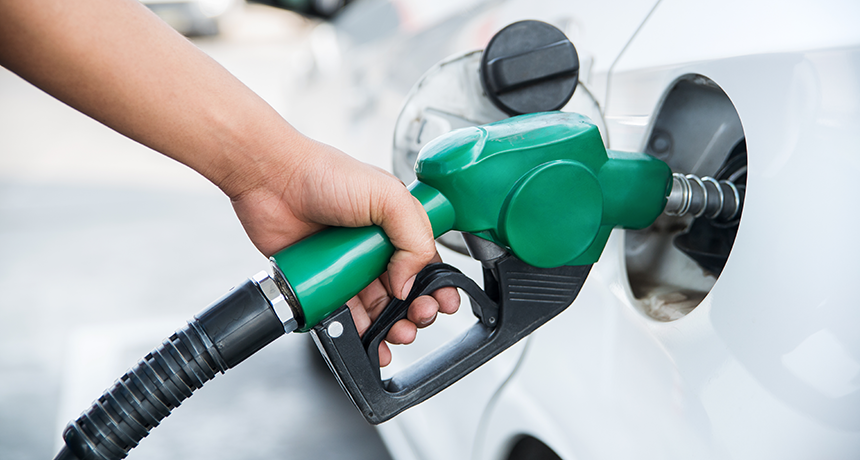The demand for fuels in Spain registered a historical drop and reached levels of the 90s as a consequence of the pandemic , while the prices of sale to the public were at the lowest levels of the decade, according to the annual report of supervision of fuel distribution in service stations corresponding to the year 2020 published by the National Commission of Markets and Competition (CNMC).
Thus, during the past year, the demand for gasoline 95 and that of diesel A jointly experienced a fall17.1% and were at levels typical of the 90s as a result of the pandemic. Sales prices to the public fell to 1.2 euros per liter (-9.3%) for 95 gasoline and 1.1 euros per liter (-11.7%) for diesel A on an annual average.
The drop was less than that experienced by the reference products (gasoline and diesel) in the international markets. This is explained, according to the CNMC, because the rise in the gross distribution margin in Spain, that is, the difference between the price before taxes and the international price, reached all-time highs: 25 euro cents per liter for gasoline 95 and 24 euro cents per liter for diesel A, on an annual average.
Likewise, the price differentialsand gross margins with Europe widened. On the supply side, a continuous growth of the service station network was observed, led by independent installations, although with little penetration of the model without on-site personnel, a model that, in the opinion of the body chaired by Cani Fernández, it would help to reduce distribution costs and therefore gross margins.
In 2020, independent gas stations exceeded 40% share in terms of points of sale. With gross margins lower than those of the flagged stations, they applied a greater reduction in their sales prices. In its report, the CNMC concludes that the measures included in Law 11/2013 to promote competition in the retail distribution of fuels have had a positive effect,
In contrast, the network of the main operator (Repsol Group) has been reduced, significantly reducing its presence in many provinces. By virtue of said Law, the opening of new facilities was facilitated, certain restrictions were imposed on the flagged service stations to give the retail entrepreneur freedom when setting their prices at the gas station, softening the relationship contracts with wholesale operators and limited the expansion of the networks of the dominant operators, in particular Repsol and Cepsa with quotas at the provincial level (island or autonomous city) higher than 30%.
On an annual average and for the peninsular area, in 2020 differences of the order of 9 cents per liter could be observed between the service stations of the different groups (7 cents per liter in 2019).
Cheaper standalone gas stations
The improvement observed in recent years is mainly due to the independent facilities that, in addition to growing in number, continued to lower prices compared to those of the service stations of the flagship networks that, on the contrary, showed a significant alignment of prices.
The gross distribution margin (difference between the price before taxes and the international reference price of the wholesale price) has maintained an increasing trend in recent years, explained by the costs associated with the point of sale, but also by the costs associated with regulatory obligations, which fall on wholesale operators.
The most significant regulatory obligations are the maintenance of minimum security stocks, contributions to the National Energy Efficiency Fund and the obligation to market biofuels. The latter, according to the CNMC, is the main reason for the increases observed in the gross margin in the period analyzed, since penetration targets have been established for these increasingly demanding products.
“Improvable” competition
Therefore, the CNMC concludes that fuel prices in Spain respond to a level of competition that could be improved (despite the improvement in recent years) and to structural factors typical of the Spanish market.
Finally, the CNMC in its report makes a series of recommendations to improve competition and market supervision, among them that the regulations do not put barriers to the installation of more cost-efficient service stations that are not justified by reasons of general interest .
Energy accelerates inflation to 2.2% in April due to electricity and gasoline
In addition, in his opinion, it is advisable to improve transparency in exclusive supply contracts in service stations with a firm sales regime, as well as to analyze a possible rethinking of the limitation of the network to operators with a quota greater than 30%.
Likewise, it considers that it is advisable to improve the information available to the Administration on exclusivity contracts and annual sales, and on the purchase prices of the product by service stations, among others.



 Bitcoin
Bitcoin  Ethereum
Ethereum  Tether
Tether  XRP
XRP  Solana
Solana  USDC
USDC  TRON
TRON  Cardano
Cardano  Lido Staked Ether
Lido Staked Ether  Avalanche
Avalanche  Toncoin
Toncoin